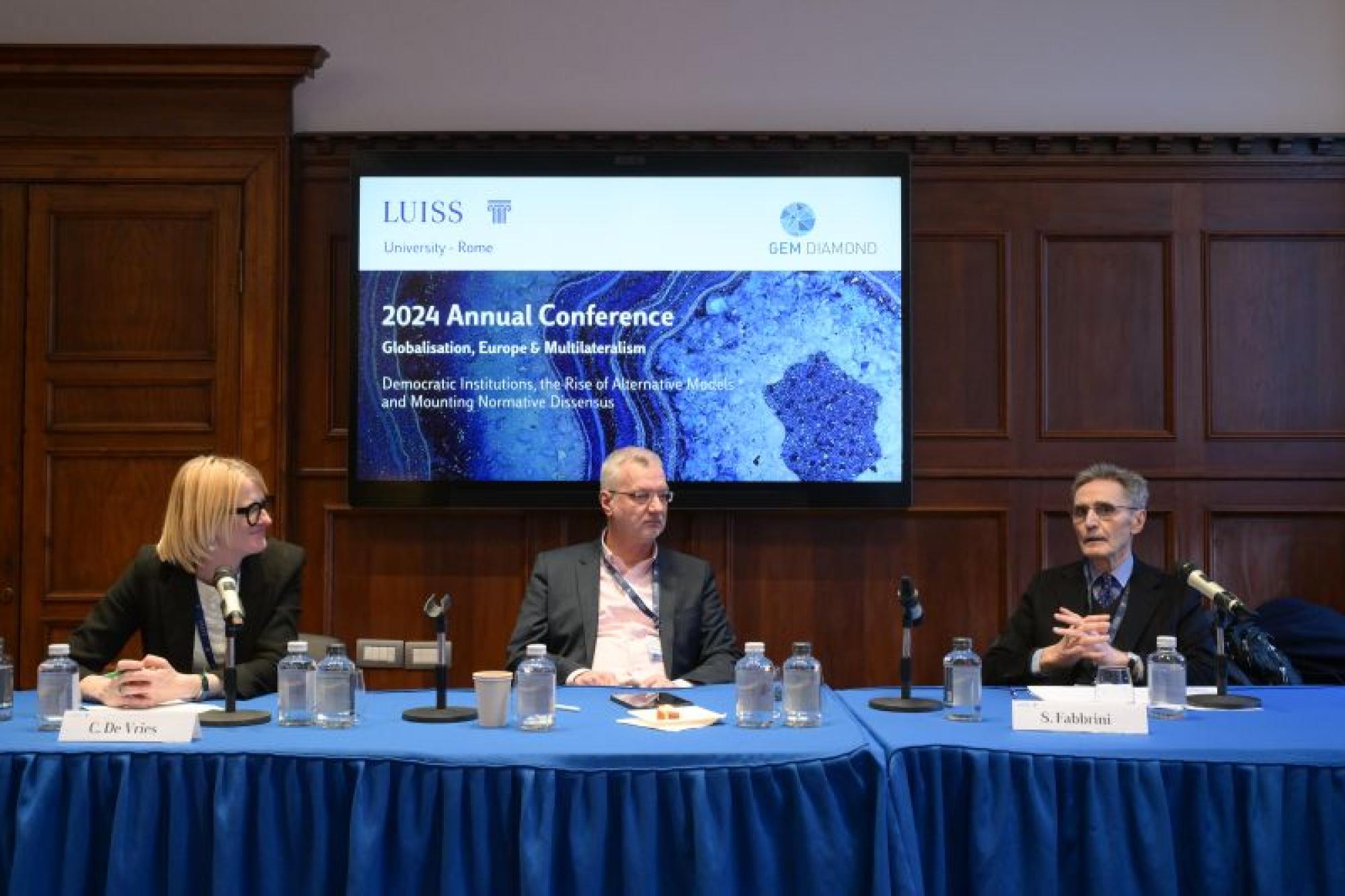Delineating future dissensus: perspectives on the European elections
Two fellows - Larissa Böckmann and Serafine Dinkel - join forces to reflect on the upcoming European elections

The first day of the GEM-DIAMOND Annual Conference at LUISS Guido Carli University in Rome ended with a fireside chat between professors Catherine De Vries (Bocconi University) and Sergio Fabbrini (LUISS Guido Carli) with the title Looking Forward (or not) to the 2024 European Elections: The Rise of Populism and its Impact on Future EU Reform. This topic speaks directly to GEM-DIAMOND’s research agenda: the challenges associated with the mounting dissensus facing liberal democracy and the rule of law. The debate was chaired by Thomas Christiansen, and discussed by Larissa Böckmann (UvA/ULB) and Serafine Dinkel (ULB, Warwick & UvA), followed by an audience Q&A.
2024 is a super-election year, seeing many national elections in Europe – Finland, Portugal, Slovakia, Belgium, Lithuania and Romania are set to vote this year – as well as the much-anticipated European Parliament elections in June. As around 360 million citizens are eligible to vote this June, Catherine De Vries and Sergio Fabbrini shared some insights and careful projections based on their most recent research.
Current polling for the elections is rather bleak: It suggests a far-right turn in which the ID and ECR blocs obtain significant gains (see Politico Poll of Polls). A study by Cunningham et al. for ECFR, projects Eurosceptic populists to lead the polls in nine EU member states, and come second or third in nine more. Together, the authors estimate, Identity and Democracy (ID) and European Conservatives and Reformists (ECR) will hold roughly 25 % of the seats in parliament. While a right-wing populist group, composed of EPP, ECR, and ID seems unlikely as the latter is still marginalized in Brussels (see Mudde, 2024), the election result would still have important ramifications in areas like climate change and foreign policy. Moreover, the far-right is increasingly solidifying its influence on European decision-making as they are not only represented in the European Parliament, but also in the Council.
Catherine de Vries noted that the European parliament elections reflect the difficulty of obtaining democratic legitimacy under the current institutional setup of the EU in which the majority of institutions is not directly elected. As a result, the parliamentary elections can only determine a portion of the setup of decision-making inside the EU. Another obstacle is the low turnout which makes it difficult to predict the election results.
Drawing on her research, De Vries pointed out that the European Commission does not necessarily interpret its own mandate according to election outcomes. For example, the perceived 2019 “Green Wave” that served as justification for the European Commission’s far-reaching Green Deal policies do not reflect the outcomes of the 2019 parliamentary elections, in which only a small share of votes went to Green Parties. As the recent European farmers protests demonstrate, the Green Deal policies are now highly contested. Such public contestation can be the result of a lack of contestation earlier on in the policymaking process (see, for example, Antje Wiener’s work on contestation, 2014) and decision-making in non-majoritarian institutions (Zürn, 2022).
Combined, these factors could increase the vulnerability of the EU. De Vries also underlined that right-wing parties no longer necessarily pursue an EU exit, but are skeptical of deeper integration. Rather than the legislation they will enact, attention should be paid to what legislation cannot be enacted due to their potential blocking role. This will potentially be exacerbated as mainstream parties are unlikely to secure sufficient seats to ensure a winning majority when voting together.
Echoing Catherine de Vries’ analysis, Sergio Fabbrini noted that the current set-up of the far right might not necessarily reflect just populism but what he refers to as ‘sovereignism.’ Fabbrini explained that populism cannot capture the specific relations between nationalist parties and the integration process. After 2016, in fact, nationalist parties on the radical right began a process of adapting to EU integration. As such, their strategy no longer focuses on contesting the EU as such but on refuting the supranational institutions of the EU such as the European Commission and particularly the European Court of Justice, and strengthening their intergovernmental side, such as the Parliament and the Council. This is reflected in a stronger role of the European council as representative of the member states. He argued that at the level of the European Parliament plausibly there will not be a new right-left cleavage, but the new cleavage will reflect parties’ perspective on the sovereignty and authority of the EU.
We would like to thank Catherine De Vries and Sergio Fabbrini for providing valuable insights and an intriguing kick-off to the GEM-DIAMOND Annual Conference. We would also like to thank Thomas Christiansen as well as LUISS for the excellent organization.
